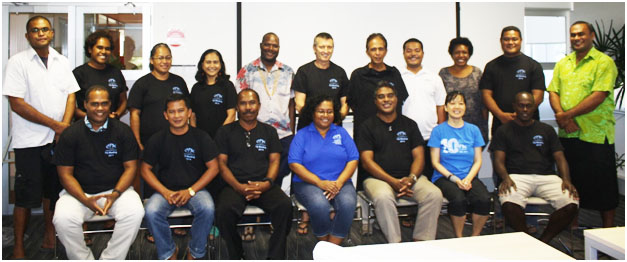Related News

Coastal fisheries are inextricably linked to the livelihoods of the people of the Indo-Pacific region. While the impact of the dwindling near-shore fisheries stock continues to be felt by dependent coastal people, there are also progressive, innovative and people-centered approaches to addressing coastal threats that are showing promising signs of improving local fisheries and sustaining community livelihoods. The Institute of Applied Science has been leading this growing movement, globally recognized and award winning local management efforts over the last 15 years.
Between the 23rd April to the 8th of May, 2014, the Institute of Applied Science (IAS) of USP on behalf of the Fiji Locally Managed Marine Area Network hosted, facilitated and chaired meetings of the Indo-Pacific Locally Managed Marine Area (LMMA) Network. In attendance were representatives of the seven LMMA countries that make up the network including Country Coordinators, the governing body of the network which is comprised of LMMA Councilors (one from each country) and technical support team. The purposes of the meetings were three fold:
An independent evaluator, Professor Andy Rowe of ARCEconomics in Canada, assisted the regional planning team of six including five IAS staff, in the design phase of the study. This included consultations with representatives of various organizations in Fiji to get their input into the study. The purpose of the consultations was to ensure that the process and ultimately the study, would be credible, salient (responsive to needs) and legitimate; building on existing studies and datasets. The study which will be trialed first in Fiji is expected to say with some degree of confidence (a) what makes a difference to communities and sustainable livelihood, (b) what are the most adaptable interventions and their costs and (c) under what conditions the above interventions will work.
“Studying these three questions has been a core aim of the LMMA Network since its inception”, said Prof. Bill Aalbersberg, one of it’s founders.
Background:
The regional network was established in 2000 and currently works with seven countries in the Indo-Pacific region including Fiji, Solomon Islands, Papua New Guinea, Palau, Pohnpei, Indonesia and Philippines. The University of the South Pacific (through the Institute of Applied Science) is a member of the Fiji Locally Managed Marine Area (FLMMA) network since its establishment in 2000 and registration as a non-charitable organization. IAS plays a key role in facilitating research through its graduate students and staff, lessons sharing, facilitating awareness and management planning workshops in communities, and assists with developing innovative approaches/solutions.